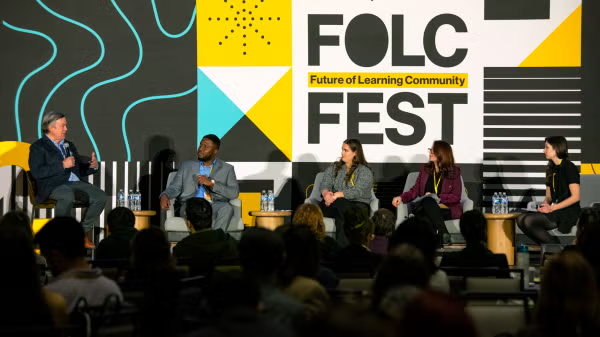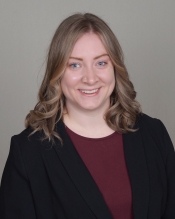First-generation college student dedicates career to improving students' experiences in STEM
Editor’s note: This story is part of a series of profiles of notable fall 2024 graduates.
When Erika Nadile was a kid, she dreamed of being the first in her family to go to college. But she wasn’t sure that dream was possible. Now, not only has she gone to college, but she’s graduating with her PhD from the biology and society program at Arizona State University this fall.
Nadile spent her PhD researching students’ experiences in biology classrooms, especially students from marginalized and sometimes hidden identities, like first-generation students. She conducted that research to try to find ways to change the classroom environment to be more inclusive and equitable, in hopes of eventually reducing the number of students from marginalized identities who drop out of STEM.
“There was very much a narrative that people like me aren’t supposed to succeed. That’s what got me involved in my research. ... It was very much like, how can we think of the lived experiences of students before they sort of reach this point where they’re dropping out of STEM?”
One aspect of the undergraduate science classroom that Nadile focused on in particular was voluntary participation. That has to do with when a professor leaves it up to students to volunteer to answer the questions they pose to a classroom, or when it’s up to a student to ask the professor a question in front of all their peers.
“An astounding number of professors –– 75%, we found –– practice that because they think it maximizes learning, but in fact, there’s no evidence to actually show that’s true,” Nadile explains.
Rather, Nadile found through her research that students of marginalized identities voluntarily participate much less than their peers, showing that the voluntary participation structure is inherently inequitable.
Nadile also spent much of her PhD being involved in the community. She spent time working for the Teaching and Learning Center, which seeks to improve classroom teaching methods, as well as for the BioBridge program, which connects new ASU students to STEM researchers and other support services on campus. Additionally, when Nadile was just starting her PhD, the COVID-19 pandemic hit, and all campus activity got shut down. That didn’t stop Nadile from organizing and making community connections; she and other students put together virtual listening sessions so graduate students could connect with each other and seek emotional support and solidarity about the pandemic and the Black Lives Matter protests online.
Nadile is continuing to work as the assistant director of STEM education at Northwestern University, where she will work to combat the inequities she spent her PhD studying by implementing more inclusive teaching practices in the classroom and by leading a STEM inclusive excellence advisory board with faculty. Now that this first-generation college student has earned her PhD, she’s dedicating her career to improving the experiences of students like her in biology classrooms and in STEM more broadly.
Question: Why did you choose to attend ASU?
Answer: I went to a biology education conference as a master’s student in 2018, and I actually saw Sara (Brownell, director of the Research for Inclusive STEM Education Center) present there ... and she just presented things in a way that was easy for anyone to understand. She was presenting really robust findings, but in a way that was digestible and practical. And that really prompted me to want to learn how to better communicate about these topics that have directly impacted me as a student.
What also drew me to ASU was the true sense of community, in the biology and society program, in the graduate college and in Sara’s Biology Education Research lab. I felt like I had people that aligned with me in those different spaces.
Q: Which professor taught you the most important lesson while at ASU?
A: Professor Kimberly Scott — I took this course called planning implementation and evaluation, and it was all about thinking about pedagogy from a different perspective. And Dr. Scott framed the class to get us to think about systemic injustices. And it felt like that was so important after 2020, to have a person who’s doing this work and bringing that to a space where we can humanize pedagogy.
She also showed me the importance of documenting our learning process through artifacts. She had us write down flashcards where we pull out different pieces of these articles that felt important, and where we’d reflect collaboratively. ... It sort of brings the researchers to life that are sharing their ideas. It’s more than just a document.
Q: What’s the best piece of advice you’d give to those still in school?
A: This might not sound science-y, but the piece of advice is not to lose sight of that gut feeling that brought you here. Grad school is hard for a number of reasons. But try not to lose that passion about what drew you to the work, the people, or even the institution in the first place.
More Sun Devil community
SolarSPELL wins 'best in show' award at South by Southwest
Arizona State University professors from a variety of disciplines made a big splash at the South by Southwest festival of technology and culture in Texas earlier this month.The ASU SolarSPELL…

How 2 women who call each other 'sis' raised ASU running back Kyson Brown
The Lancaster High School graduation ceremony has just ended, and running back Kyson Brown poses for a photo with the two most important people in his life. ASU…

FOLC Fest 2025 explores Principled Innovation, leadership and learning at ASU
"Principled Innovation is about using our creativity, knowledge and resources to make decisions that ultimately benefit humanity — not just in the short term, but for generations to come."That's what…


